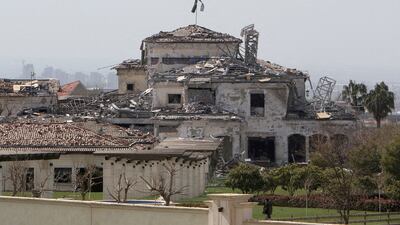US President Joe Biden's administration has imposed new sanctions on Iran, targeting its ballistic missile programme and a Revolutionary Guard unit linked to it.
The US Treasury Department on Wednesday said the sanctions were in response to a series of attacks this month by Iran and its proxies – in particular, a missile strike on Erbil in northern Iraq.
But Iran's foreign ministry said on Thursday the US sanctions are a breach of a UN resolution that enshrines a 2015 nuclear deal between Iran and world powers.
A Houthi missile attack on a Saudi Aramco depot last week and other strikes by Iranian proxies against Saudi Arabia and the UAE also informed the American decision.
The sanctions focus on Iran-based procurement agent Mohmmad Ali Hosseini and his network of companies.
The Treasury Department said these businesses “procured ballistic missile propellant-related materials for the Islamic Revolutionary Guard Corps Research and Self Sufficiency Jihad Organisation (IRGC RSSJO), the IRGC unit responsible for the research and development of ballistic missiles, as well as Iran’s Parchin Chemical Industries (PCI), an element of Iran’s Defence Industries Organisation (DIO)".
Brian Nelson, under secretary of the Treasury for Terrorism and Financial Intelligence, said Washington was committed to preventing Iran’s development and use of advanced ballistic missiles, even as it seeks to return to the 2015 nuclear deal.
“While the United States continues to seek Iran’s return to full compliance with the Joint Comprehensive Plan of Action, we will not hesitate to target those who support Iran’s ballistic missile programme," Mr Nelson said.
"We will also work with other partners in the region to hold Iran accountable for its actions, including gross violations of the sovereignty of its neighbours."
As part of its conditions to return to the nuclear deal signed in 2015, Iran has requested the removal of the Revolutionary Guard from Washington's list of foreign terrorist organisations. The US designated the force as a terrorist group in 2019.
Asked about the delisting on Sunday, US Secretary of State Antony Blinken did not give a clear answer. The IRGC, he said, “is probably the most designated organisation – in one way or another – in the world among organisations that we designate, including the foreign terrorist organisation designation".
After the attack on Saudi Arabia last week, Mr Blinken called his Saudi counterpart, Prince Faisal bin Farhan. Mr Blinken “reiterated the US commitment to bolstering Saudi Arabia’s defences against threats in the region and emphasised the importance of protecting civilians in Yemen”, the State Department said.
Iran says move is 'a sign of malice'
"This move is another sign of the US government's malice towards the Iranian people, as it continues the failed policy of maximum pressure against Iran," said foreign ministry spokesman Saeed Khatibzadeh.
UN Security Council Resolution 2231 enshrines the 2015 nuclear deal that Iran and world powers have sought to revive through negotiations in Vienna.
The talks were close to agreement in early March until Russia made last-minute demands of the US.


